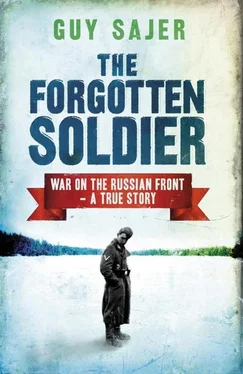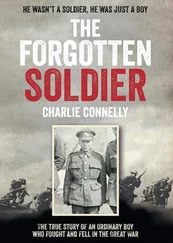As we didn’t know how to say so much as “hello” in Russian, we always went into these places talking among ourselves. The few Russians who were inside invariably assumed an attitude half anxious, half smiling, while the shopkeeper or proprietress would approach us with a white-lipped smile and offer us large dippers of these products, in an obvious effort to placate the fierce warriors they imagined us to be.
We were often given a fine yellowish flour to mix into this syrup whose taste was far from disagreeable, somewhat reminiscent of honey. Its only discouraging aspect was a superabundance of fat. I can still see the faces of those Russians, smiling as they held out this product and pronouncing a word which sounded rather like “ourlka.” I never was sure whether this meant “eat” or was simply the name of the mixture. There were days when we really gorged ourselves on “ourlka,” which nonetheless did not prevent us from appearing at eleven o’clock for the official midday meal.
Hals accepted everything the Russians offered him with so much politeness. Sometimes I found him quite revolting, holding out his mess tin for the largess of these Soviet merchants as they poured into it mixtures resembling each other only in their loose, runny consistency. Sometimes his tin would hold a combination of the famous ourlka , cooked wheat, salt herring cut into pieces, and several other ingredients. Whatever the concoction, Hals devoured it with evident relish, like a great pig. Except for these moments of distraction seized in the intervals between our many jobs, we scarcely had time to amuse ourselves. Minsk was an important army supply center, where shipments were constantly loaded and unloaded.
Life for the troops in this sector was remarkably well-organized. Mail was distributed; there were films for soldiers on leave — which we were not allowed to attend — libraries, and restaurants run by Russian civilians, but reserved entirely for German soldiers. The restaurants were all too expensive for me and I never went into them, but Hals, who would sacrifice anything for a good stuffing, spent all his money in these places, and a certain amount of ours. The understanding was that he would give us a detailed account of his experiences, which he adhered to faithfully, with many embellishments. We slavered with vicarious pleasure as we listened to him.
We were much better fed than we had been in Poland, and were able to supplement our rations very cheaply — which we really needed to do. The cold in these opening days of December had become extremely sharp, dropping to more than five degrees below zero. The snow, which fell in great abundance, never melted, and in places was already over three feet deep. Evidently this slowed the movement of supplies to the front, and, according to troops returning from forward positions where the cold was even more bitter than at Minsk, the poor fellows were reduced to sharing rations which were already ridiculously small. Insufficient food combined with the cold produced many cases of pneumonia, frostbite, and frozen limbs.
At this moment, the Reich was making an immense effort to protect its soldiers from the implacable hostility of the Russian winter. At Minsk, Kovno, and Kiev, there were enormous stores of blankets, special winter clothing made of sheepskin, overshoes with thick insulating soles and uppers of matted hair, gloves, hoods of double catskin, and portable heaters which operated equally well on gasoline, oil, or solidified alcohol, mountains of rations in specially conditioned boxes, and thousands of other necessities. It was our duty, as convoy troops of the Rollbahn, to deliver all of this to the front lines, where the combat troops were desperately awaiting us.
We made superhuman efforts, and yet they were not enough. The punishment we suffered, not at the hands of the Russian Army, which until that moment had done almost nothing except retreat, but from the cold, is almost beyond the powers of description. Outside the great towns there had not yet been time to repair the damaged roads — few and far between to begin with — or to open others. While our unit was doing its autumn gymnastics, the Wehrmacht, after an extraordinary advance, had marched itself and its supplies into an unbelievable quagmire. Then the first frosts had solidified the monstrous ruts leading to the east. Our machines had suffered enormously on these roads, which in fact were passable only for wagons, but the hardening of the soil had temporarily allowed the provisioning of the troops. Then winter poured down its tons of snow across the immensity of Russia, once again paralyzing traffic.
That is the point we had reached in December, 1942. We shoveled away snow so that our trucks could move forward fifteen or twenty miles in a morning, only to find our efforts covered over again the same day. The earth beneath the snow was a sinister relief of bumps and potholes, which we tamped down or blew up. In the evenings we scrambled to find shelter for the night.
Sometimes this would be a but fitted out by the engineers, sometimes an isba, [3] A log hut.
or any house we could find. We often crowded more than fifty men into a but intended for a couple and two children. The most desired accommodations were the big tents especially designed for Russia. They were tall and pointed, like teepees, weather-proofed, and planned for nine men. We were rarely fewer than twenty, and even at that there weren’t enough tents. Luckily, we had raided our stores of food because of the cold, and with enough to eat, we were able to keep going reasonably well. Some of us began to crawl with vermin, as we were only rarely able to wash, and when we returned to Minsk, our first duty was to pass through disinfection.
I was beginning to feel that I’d had more than enough of Holy Russia and of truck driving. Like everybody else I was afraid of the idea of being under fire, but I was also beginning to long to use the Mauser which had been dragging around with me for what seemed like an eternity, without ever being the slightest use. I felt that somehow firing at something would avenge me for my sufferings from the cold, and from my blisters. My hands were badly blistered from shoveling, and my woolen gloves were already full of holes, exposing the tops of my icy fingers. My hands and feet felt the cold so sharply that it sometimes seemed as if the pain were stabbing me in the heart. The thermometer remained around five degrees below zero.
We were now billeted some fifteen miles north of Minsk, guarding a huge parking depot for military vehicles. We occupied the seven or eight houses in the hamlet, leaving only one, the largest, occupied by a Russian family. Their name was Khorsky; they had two daughters and claimed to have originally come from the Crimea, which they spoke of with nostalgia. They ran a kind of canteen where we could buy food and drink — from our own pockets — and find a few companions with whom to kill time.
The snow had stopped, but the cold was growing steadily more intense. One evening after our company had been in the hamlet for about a week, I was scheduled for two hours of guard duty. I crossed the huge parking lot, where five hundred or more vehicles of every description were half buried in snow. I had been feeling apprehensive all day at the prospect of walking across this space at night. It would be so easy for partisans to hide between the cars and shoot us as we went by. But I had gradually persuaded myself that the war, if it existed at all, was really taking place somewhere else. The only Russians I had seen were either merchants or prisoners, and it seemed highly probable that I would never see any others.
With this idea in my head, I walked to my post, about fifteen yards from the first vehicles, through a trench about a yard deep, which allowed us to advance as far as the cars, or withdraw, without being exposed. The edges of the trench had already been raised nearly another three feet by new snow, and each fresh fall obliged us to dig. I stood up on the box that allowed the sentry to see a little farther. I had wrapped a blanket over my coat, which made it very hard for me to move my arms.
Читать дальше












